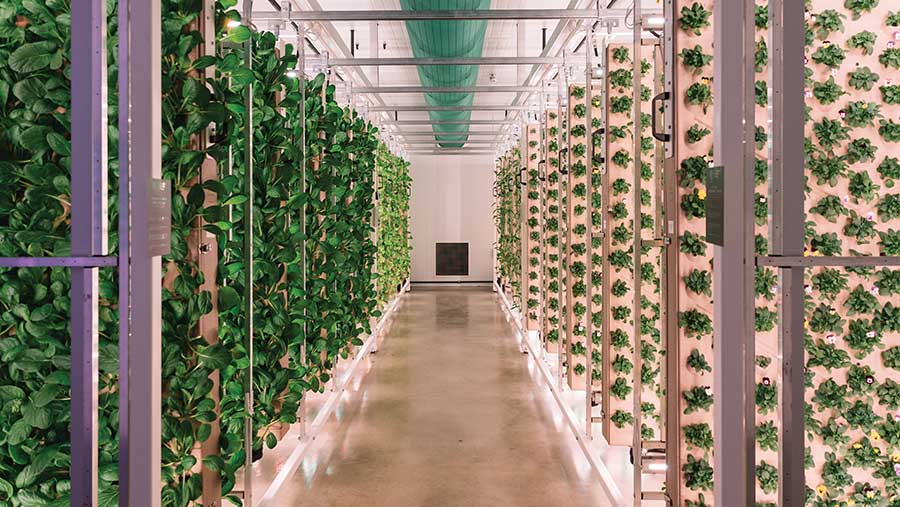Vertical growing systems – the next big farm diversification?
 IAG GrowFrame 360 © Stuart Bailey
IAG GrowFrame 360 © Stuart Bailey Establishing an on-farm vertical farming system could open the door for farmers to develop an additional revenue stream to sit alongside traditional agricultural practices.
Vertical farming involves growing plants such as leafy greens and herbs indoors under fully controlled conditions in stacked layers, without sunlight or soil.
See also: Research targets pheromones to control key arable pests
Visitors to the Farmers Weekly stand at New Scientist Live (7-9 October) were able to view a model of the GrowFrame 360 system, which comprises vertical aeroponic panels.
Systems such as this can be developed in almost any space, from an old farm building to a single shipping container, providing opportunity for farmers to cash-in on the novel method of food production.
Diversification and succession
Kate Brunswick, business development director at vertical farming company Innovation Agritech Group (IAG) explains: “This technology has the potential to be an on-farm diversification project; the business model would work well for farmers looking to widen their income streams.
“It could form part of a family succession plan and has the ability to encompass a huge core of careers within the agricultural and agri-tech sector, such as agronomy, plant science, design engineering or irrigation intelligence.”
IAG offers a full building survey and complete turnkey installation process which can see a 130sq m vertical farm established in just 16 weeks using the GrowFrame 360. Return on investment can be expected within three to four years.
Accredited by Red Tractor and Global GAP, the firm can also help clients establish a route to market for their produce, either directly to supermarkets or to alternative retailers.
Cut food miles
The practice of vertical farming is aimed at reducing food miles, placing the crop closer to the consumer, with a capability of growing crops 365 days a year.
Produce is completely protected from seasonal weather, pests and diseases, thereby providing a consistent supply outside of the UK growing season.
Crops can be grown significantly faster in a controlled environment, compared with a field-grown salad crop.
“We’re looking at growing niche herbs and leafy greens which are otherwise imported from countries as far as Africa, Peru and Israel.
“With this technology we are able to increase food security, cut down on food miles and minimise water use.”
In fact, vertical farms could be set up near food manufacturers, supermarkets, wholesalers and within urban areas.
“Rather than importing herbs and salads from the other side of the world, we encourage them to be grown the other side of the wall,” says Kate.
How it works
The system encompasses 10 vertical panels with full-spectrum LED lighting to promote high quality and yield.
The frames can be stacked up to two high and deploy an automated closed-loop irrigation system, minimising water use.
Vertical farming grows crops in soil-less conditions. A growing medium known as coir, which is a by-product from the coconut industry, is used instead.
The system is fully controlled and the LED lighting provides different wavelengths specific to each crop and growth stage.
Automated irrigation provides precise nutrient and water application, requiring up to 95% less water than conventional farming.
For most crops, there will be up to 15 harvest cycles a year.
“By optimising the environment we can promote yield, quality and flavour – crops grown in these conditions tend to have a particularly strong aroma,” says Kate.
IAG is continuing to scale up the technology to complement traditional UK farming practices.
The technology does not lend itself to growing cereal crops or staple root crops due to very shallow growing depths.
There is a huge potential for development overseas in countries such as Dubai and Saudi Arabia, where soil is a limited resource for food production.
Vertical farming could go a long way to reducing freighted imports and promoting food security.
The Future of Food & Agriculture: Feeding the world sustainably – meet the team


Farmers Weekly is working with these organisations to bring the Future of Food & Agriculture exhibit to New Scientist Live.
Partners
Harper Adams University is our lead education partner
